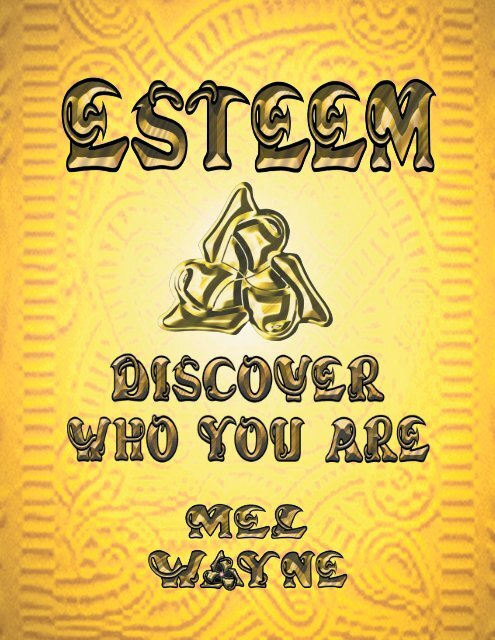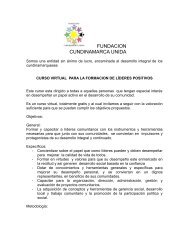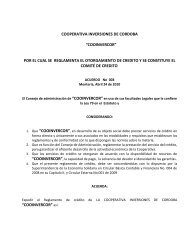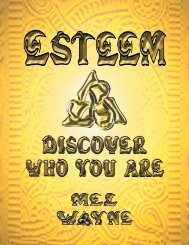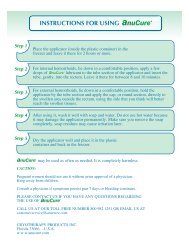Esteem: Discover Who You Are
Esteem: Discover Who You Are
Esteem: Discover Who You Are
Create successful ePaper yourself
Turn your PDF publications into a flip-book with our unique Google optimized e-Paper software.
“Thoughts are the most<br />
powerful force in the universe.”<br />
—Metamorphosis<br />
II
Mel Wayne<br />
III
Wayne, Mel.<br />
Cataloging In Publication Information<br />
<strong>Esteem</strong> : discover who you are / by Mel Wayne.<br />
ISBN - 1 3 : 9 7 8 - 0 - 9 6 4 2 0 2 2 - 7 - 6<br />
I S B N - E b o o k - 1 3 : 9 7 8 - 0 - 9 6 4 2 0 2 2 - 6 - 9<br />
1. Self-<strong>Esteem</strong> 2. Inspiration 3. Self-Help<br />
4. Self-Actualization 5. Leadership I. Title.<br />
Artwork: Maps, Paintings and Illustrations by = Hunter Wainright :<br />
Alan Michael Smith, Dell Barras, Charles Bloomer, and Mel Wayne.<br />
Edited by Pamela, the wise reader.<br />
No part of this book may be reproduced by any mechanical, photographic, or<br />
electronic process, or in the form of a phonographic recording; nor may it be stored<br />
in a retrieval system, transmitted, or otherwise be copied for public or private<br />
use—other than for “fair use” as brief quotations embodied in articles and reviews—<br />
without prior written permission of the publisher.<br />
The author of this book does not dispense medical advice or prescribe the use of<br />
any technique as a form of treatment for physical, emotional, or medical problems<br />
without the advice of a physician, either directly or indirectly. The intent of the<br />
author is only to offer information of a general nature to help you in your quest for<br />
emotional and spiritual well-being. In the event you use any of the information<br />
in this book for yourself, which is your constitutional right, the author and the<br />
publisher assume no responsibility for your actions.<br />
Octilogy TM and Planet Millennium TM are registered Trade Marks.<br />
International Standard Book Number: 13: 9 7 8 - 0 - 9 6 4 2 0 2 2 - 7 - 6<br />
Copyright © 2013 by Freedom Within Foundation. All Rights Reserved.<br />
IV
M el Wayne<br />
Author<br />
With the vision of inspiring you to discover<br />
personal insights into who you truly are, how<br />
to immediately improve your life—<br />
“change your thinking, change your life”—<br />
Mel Wayne presents his inspirational book:<br />
<strong>Esteem</strong>: <strong>Discover</strong> <strong>Who</strong> <strong>You</strong> <strong>Are</strong>.<br />
The cure for the Dark Plague, Curse of the Universe,<br />
is presented in a new and enlightening way.<br />
Inspirational books by Mel Wayne<br />
• The Great Way<br />
• The Great Way - Deluxe Color Edition<br />
• M o r p h : S a g e o f t h e A g e s<br />
V
www.TheGreatWayBook.com<br />
www.TheGreatWayBlog.com<br />
www.FreedomWihinFoundation.org<br />
“There is no time but this time;<br />
there is no moment but this moment .”<br />
—Metamorphosis<br />
Visit Mel Wayne at<br />
<strong>You</strong>Tube Facebook Twitter<br />
<br />
VI<br />
I
Table of Contents<br />
Change is Possible<br />
I. Identify Low Self-<strong>Esteem</strong><br />
II. Recognize High Self-<strong>Esteem</strong><br />
III. <strong>Discover</strong> Others—<strong>Discover</strong> Self<br />
IV. Silence—Learn to Listen<br />
V. Never Say “I” Until Asked<br />
VI. Eliminate Put Downs<br />
VII. Forgive and Forget<br />
VIII. Live Life as a Leader<br />
Extractor Compendium<br />
Page 9<br />
Page 13<br />
Page 32<br />
Page 36<br />
Page 40<br />
Page 46<br />
Page 52<br />
Page 58<br />
Page 66<br />
Page 82<br />
VII
i v e i f e as a e a d e r<br />
“The universe has many voices; just listen.”<br />
—Metamorphosis<br />
VIII
Change Is Possible<br />
ll things happen in perfect order.<br />
The arrival of this book in your<br />
life is no exception. <strong>You</strong> are<br />
about to experience a lifechanging<br />
event, an epiphany of the highest<br />
order. <strong>You</strong> will soon discover that you do have<br />
control of your life, that change is possible.<br />
<strong>You</strong>r quest for inner change begins with an<br />
intriguing question. The question is, “What<br />
devastating Emotional Virus has infected<br />
humans throughout recorded history—since<br />
the dawn of social awareness?”<br />
The awakening answer is: low self-esteem.<br />
<strong>You</strong> are about to discover that many people<br />
you know and love suffer from the emotionally<br />
crippling disease (dis-ease) known as low selfesteem.<br />
Often referred<br />
to as “egotistical<br />
behavior”, the low selfesteem<br />
Emotional Virus<br />
has been unintentionally passed from<br />
parents to children, generation to generation,<br />
since the beginning of civilization. All humans<br />
suffer from some form of the Emotional Virus.<br />
If you doubt the above statement, think<br />
for a moment. Whenever low self-esteem is<br />
mentioned, the typical response is, “I don’t<br />
have low self-esteem!” The reason people deny<br />
it is because they have it and do not know it.<br />
Low self-esteem sufferers are not aware of<br />
their condition, or they live in denial.<br />
Whenever high self-esteem is mentioned,<br />
people exclaim, without hesitation, “Oh, I<br />
have high self-esteem!” As you will soon<br />
discover during your search for happiness and<br />
contentment, the people who possess a healthy<br />
self-image never make such statements.<br />
“Keep in mind that each moment is special,<br />
that each experience has its own treasure.”<br />
—Metamorphosis<br />
<br />
Now that you have begun your quest<br />
to discover who you truly are, there is an<br />
excellent chance you are experiencing anxiety,<br />
denial, confusion, or anger. After all, you just<br />
read that your friends, relatives, coworkers,<br />
and life partner—everyone—suffers from<br />
some form of the Emotional Virus. Right now,<br />
you might be thinking, “Do I, myself, have<br />
low self-esteem?” or possibly, “I know I don’t<br />
have low self-esteem; this book was written<br />
for someone else.” Perhaps you feel calm and<br />
reassured, realizing you have finally found the<br />
answer to why you are so unhappy.<br />
Whatever your reaction, one thing is<br />
certain: your desire to become a better<br />
person—to change—has brought you to this<br />
unique moment in<br />
time, to this page in<br />
this book—<strong>Esteem</strong>.<br />
Relax, breathe<br />
deeply, and begin the revelation<br />
of a lifetime—the self-discovery that you<br />
are going to change, that you are going to<br />
grow emotionally, that you are going to find<br />
contentment. For indeed, the bliss of eternity<br />
may be found in your own contentment.<br />
To begin your quest for change, you must<br />
determine how you interact with people; that<br />
is, how you behave toward others. Based on<br />
your own self-image, there are two ways you<br />
deal with the people around you:<br />
• The low self-esteem way.<br />
• The high self-esteem way.<br />
The low self-esteem way, also known as<br />
“taking the low road”, is based on intimidation,<br />
manipulation, deception, extortion, arrogance,<br />
domination, selfishness, and greed.
One or more persons “win” while all<br />
others are “losers”. <strong>You</strong> will soon discover<br />
why “taking the low road” is the behavior<br />
most people choose.<br />
The high self-esteem way, “the high road”,<br />
is based on the even exchange of what all<br />
persons, or parties, desire. The result is fair<br />
exchange, give and take, a workable solution,<br />
a consensus. Everyone feels satisfied with<br />
the results or outcome. It is a win-win-win<br />
situation.<br />
Dealing with people<br />
by always taking “the high<br />
road”—living the highest<br />
truth—allows you to feel good about yourself.<br />
To like your Self is the foundation for your<br />
happiness. <strong>You</strong> must like your Self in order<br />
to know who you truly are. Once you know<br />
your Self, you acquire the most desirable trait<br />
anyone can possess—high self-esteem—you<br />
live in a state of contentment. Bliss.<br />
A LIFE-CHANGING CONCEPT<br />
Emotional illness, often described as<br />
dysfunctional and egocentric behavior, is the<br />
result of suffering from low self-esteem, not<br />
the reverse. Stating, “I have low self-esteem<br />
because I am depressed” is incorrect. The<br />
correct statement is, “I am depressed because<br />
I have low self-esteem!” Therefore, by<br />
eliminating low self-esteem, you eliminate<br />
depression and all your other bad habits,<br />
addictions, and egotistical behaviors.<br />
“Listen to the voice within you.”<br />
—Metamorphosis<br />
The elimination of<br />
low self-image will cure<br />
all personality disorders,<br />
including anger, impatience,<br />
violence, hatred, revenge, anxiety, loneliness,<br />
envy, jealousy, greed, racism, eating disorders,<br />
alcohol and drug abuse, dishonesty, guilt, and<br />
depression—just to name a few!<br />
When humans acquire a higher self-image,<br />
violence and war will end. Hatred and jealousy<br />
will cease to exist. Societies will function in<br />
a state of peace and cooperation. A collective<br />
10<br />
consciousness of positive thoughts—high selfesteem—provides<br />
the foundation for a society<br />
of loving, compassionate citizens.<br />
DO I HAVE AN EMOTIONAL VIRUS?<br />
How will you know if you suffer from low<br />
self-esteem—if you have been infected with<br />
the Emotional Virus—Dark Plague?<br />
<strong>You</strong> will know by identifying what low<br />
self-esteem looks like and acts like. <strong>You</strong><br />
must recognize the disease<br />
symptoms. By identifying<br />
low self-esteem— egotistical<br />
behavior—you will know if<br />
you are infected with the Emotional Virus, and<br />
if the people around you are infected.<br />
To acquire freedom within, you must<br />
be able to identify all the low self-esteem<br />
behaviors and eliminate them, one by one,<br />
from your life. <strong>You</strong> must change your thinking.<br />
Change your thinking means eliminate<br />
negative thoughts and replace them with<br />
positive thoughts—affirmations. The reward is<br />
inner peace. Freedom within.<br />
EPIPHANY<br />
People describe an epiphany as “a bright<br />
light turning on inside their heads”. Often<br />
described as the “ahha” moment, you will<br />
know it when it happens.<br />
<strong>You</strong>r transformation, your inner change,<br />
begins with an epiphany. The epiphany<br />
unlocks your mind to the possibility of change.<br />
Without an<br />
“In the middle of difficulty, lies opportunity.” epiphany, change<br />
—Metamorphosis<br />
in your life will<br />
never happen.<br />
A life-changing event is about to happen to<br />
you, an epiphany of the highest magnitude.<br />
As you boldly begin your quest for<br />
personal freedom—freedom within—your<br />
willingness to change rewards you with life’s<br />
greatest treasures. <strong>You</strong> are about to discover<br />
the highest truth—who you truly are—that<br />
change is possible.
Eight Ways to Change<br />
I. Identify Low Self-<strong>Esteem</strong><br />
II. Recognize High Self-<strong>Esteem</strong><br />
III. <strong>Discover</strong> Others—<strong>Discover</strong> Self<br />
IV. Silence—Learn To Listen<br />
V. Never Say “I” Until Asked<br />
VI. Eliminate Put Downs<br />
VII. Forgive and Forget<br />
VIII. Live Life as a Leader<br />
11
Emotional Virus<br />
12
I<br />
Identify Low Self-<strong>Esteem</strong><br />
he identification of the Emotional<br />
Virus—low self-esteem and egotistical<br />
behavior, is the first and most<br />
revealing change in your quest for<br />
a higher self-image. It is easy to identify low<br />
self-esteem characteristics by describing low<br />
self-esteem personality traits.<br />
Prepare yourself for an emotional<br />
revelation—an awakening—an epiphany.<br />
There is an excellent chance you will discover<br />
some of your own character traits in the<br />
upcoming descriptions.<br />
<strong>You</strong> will either feel enlightened and<br />
experience a change of thought, or you will<br />
experience feelings of confusion and denial,<br />
becoming emotionally upset.<br />
<strong>You</strong> are about to discover that nothing, no<br />
thing, is more powerful than the truth—the<br />
highest truth—being honest with yourself.<br />
Symptoms of the Emotional Virus<br />
Low Self-<strong>Esteem</strong><br />
The Emotional Virus—low self-esteem—<br />
has reached epidemic proportions. The first<br />
question you might ask is, “How do I know<br />
this Dark Plague—Curse of the Universe,<br />
really exists?” The way to uncover the truth is<br />
to ask yourself simple questions about human<br />
behavior, about common personality traits.<br />
Begin with the question, “Do I, or anyone<br />
I know, act or behave angry, impatient,<br />
hotheaded, sarcastic, jealous, violent, cruel,<br />
hateful, insensitive, vain, greedy, unethical,<br />
immoral, rude, phony, paranoid, dishonest,<br />
co-dependent, obnoxious, indecent, sad, lazy,<br />
oversensitive, irresponsible, rebellious, moody,<br />
depressed, suicidal, revengeful, unforgiving,<br />
13<br />
selfish, materialistic, or envious?”<br />
If you answered “No” to the above<br />
questions, ask yourself, “Do I, or anyone<br />
I know, ever make fun of others, laugh at<br />
others’ mistakes, interrupt others, talk only<br />
about themselves, argue, constantly complain,<br />
scream at a spouse, yell at a child, make<br />
obscene gestures, intimidate others, tease<br />
others, dwell on the past, procrastinate, sulk,<br />
or suffer from fear of failure?”<br />
If you are still answering “No”, how<br />
about, “Is anyone I know a liar, gossip, poor<br />
listener, braggart, loudmouth, talkaholic,<br />
blabbermouth, flirt, cheater, thief, racist,<br />
supremacist, workaholic, spendthrift,<br />
perfectionist, gambler, drug user, alcoholic,<br />
food abuser, sore loser, sociopath, dare devil,<br />
party animal, lazy, or reclusive loner?”<br />
If you are still answering “No” to the<br />
questions, it is time to read a newspaper, a<br />
blog, the Internet, a magazine, or watch the<br />
nightly news, and you will easily identify<br />
the following low self-esteem personalities:<br />
dictators, drug lords, terrorists, carjackers,<br />
serial killers, rapists, arsonists, rioters,<br />
shoplifters, con artists, slum lords, and<br />
corrupt politicians—to name a few.<br />
After answering “No” to the questions,<br />
people reluctantly admit, “Well, maybe I do<br />
get a little impatient and yell at the kids...so<br />
what!” or “Maybe I’m guilty of taking home<br />
a pencil or paper clips from the office...big<br />
deal, it’s only small stuff!” or “When I scream<br />
at other drivers on the freeway, I feel better...<br />
anyway, they usually deserve it.”<br />
<strong>You</strong> hear statements such as, “I am doing<br />
what my parents taught me and look how
good I turned out!” or “So what if I get angry,<br />
or jealous, or depressed; it’s normal to feel<br />
that way!”<br />
The responses go on—and on—and on.<br />
Many people conclude their comments by<br />
declaring, “Okay, I admit I have one or two<br />
personality traits mentioned on the list, but<br />
that doesn’t mean I have low self-esteem.”<br />
Another typical response is, “I know low selfesteem<br />
people are bad and I’m good; therefore,<br />
I can’t have low self-esteem.”<br />
<strong>Are</strong> these responses right or wrong?<br />
As mentioned earlier, many people will<br />
not admit they suffer<br />
from low self-esteem.<br />
Some individuals are<br />
somewhat aware of<br />
their disorders, living in<br />
a self-denial mode, but<br />
the majority of people<br />
are simply unaware or<br />
uneducated about what low<br />
self-esteem really is—what the<br />
Emotional Virus looks like.<br />
So back to the question.<br />
When an individual admits<br />
to yelling at children and<br />
then adds, “But that<br />
doesn’t mean I suffer<br />
from low self-esteem,” is the<br />
individual right or wrong? Is the<br />
statement correct or incorrect?<br />
To answer now would be untimely and<br />
inappropriate, for the path to personal<br />
freedom must be traveled cautiously.<br />
First, you must find out exactly what low<br />
self-esteem acts like and behaves like so you<br />
may begin your self-esteem journey—your<br />
search for a higher self-image—to discover<br />
who you are. It is time for you to meet those<br />
familiar low self-esteem characters you<br />
encounter every day of your life—at home, at<br />
work, at play, and in personal relationships.<br />
<strong>You</strong> must learn how they behave, before<br />
you learn why they behave as they do.<br />
14<br />
The low self-esteem personalities are:<br />
The Intimidator<br />
The Impatient Hothead<br />
The Power Fanatic<br />
The Sarcastic Assassin<br />
The Depressant<br />
The Oversensitive Soul<br />
The Shy Scaredy Cat<br />
The Hypocrite Liar<br />
The Compulsive Addict<br />
The Co-Dependent<br />
The Unfriendly Phony<br />
The Procrastinator<br />
The Miserable Miser<br />
The Show Off Braggart<br />
The Unethical Trickster<br />
The Stressaholic<br />
The Gossip Monger<br />
The Talkaholic<br />
The Spoiled Brat<br />
The Conceited Looker<br />
The Pessimist<br />
The Prankster<br />
The Arguing Sorehead<br />
The Unforgiving Avenger<br />
The Unfaithful Lover<br />
The Rebel Outlaw<br />
The Moody Maniac<br />
The Angry Bigot
The Intimidator<br />
These Controlling Characters are the<br />
domineering physical Bullies who get in your<br />
face and resort to physical violence to get<br />
their way. Preying on smaller and weaker foe,<br />
these Bullies specialize in the physical threat,<br />
obscene gesture, or scare tactic before their<br />
opponent “gets the upper hand”.<br />
How do Intimidators function in society?<br />
At home, Pushy Individuals are overbearing<br />
and rule with an iron fist, unwilling<br />
to bend or compromise.<br />
During school, Bullies choose off and<br />
intimidate everyone in the schoolyard.<br />
At work, Ruffians order coworkers around.<br />
If they are the boss, these Dominators threaten<br />
employees with demotions and terminations<br />
as part of the daily work routine.<br />
At play, Brutes wipe out their opponents,<br />
determined to beat their adversary at any cost.<br />
At personal relationships, Intimidators rule<br />
the nest by harassing their timid partner into<br />
fear and emotional submission with violent<br />
threats followed by degrading put downs.<br />
The Impatient Hothead<br />
These Volatile Characters are angry and<br />
upset about everything, finding any excuse<br />
to yell and scream at family members, friends,<br />
relatives, coworkers and any unfortunate<br />
strangers who cross their path. These angry<br />
Loudmouths are incredibly short-tempered and<br />
easily provoked. They are extremely impatient,<br />
unwilling to wait for anything. They specialize<br />
in appearing calm but may explode into an<br />
uncontrollable rage without warning.<br />
How do Impatient Hotheads function in society?<br />
At home, Yellers are unpredictable and<br />
shout about the least little incident.<br />
At work, Screamers recklessly raise their<br />
voices at coworkers, overreacting to mistakes.<br />
At play, Time Bombs yell insults and<br />
obscenities, especially when they are losing or<br />
not getting their way.<br />
At personal relationships, Impatient<br />
Hotheads cause their ill-at-ease partner to<br />
live in constant fear of being harassed, yelled<br />
at and screamed at—a fearful, one-sided<br />
relationship of emotional unrest.<br />
“What does low self-esteem<br />
look like?”<br />
—Metamorphosis<br />
“Low self-esteem<br />
is not pretty!”<br />
—Metamorphosis<br />
See The Intimidator<br />
• Extractor Compendium<br />
Page 86<br />
See The Impatient Hothead<br />
• Extractor Compendium<br />
Page 86<br />
15
The Power Fanatic<br />
These tyrannical Slave Drivers are obsessed<br />
with total power and control—craving money,<br />
cars and real estate at the expense of others.<br />
Dictators believe the oppression of people<br />
equals success. Overachievers, unable to enjoy<br />
accomplishments, set unrealistically high<br />
standards, resulting in their persistent need to<br />
prove themselves. Envious of others, the more<br />
they get—the more they want.<br />
How do Power Fanatics function in society?<br />
At home, Perfectionists demand having<br />
things done their way, and only their way.<br />
At work, Controllers bark orders and call<br />
the shots, methodically plotting the overthrow<br />
of others to gain position and wealth—power.<br />
At play, Tyrants are too serious, becoming<br />
emotionally devastated when losing.<br />
At personal relationships, Power Fanatics<br />
relentlessly pursue their “prey” and once<br />
captured, their tormented partner is treated<br />
(mistreated) as a worldly possession—object.<br />
The Sarcastic Assassin<br />
These Put Down Artists hurt your feelings.<br />
Bad Mouthers avoid physical confrontations,<br />
making you feel small and embarrassing you<br />
before you become a threat. Disguising cruel<br />
comments as friendly jokes and sarcastic<br />
statements, they complete each personal<br />
assault—put down—with, “Just Kidding!”<br />
How do Sarcastic Assassins function in<br />
society?<br />
At home, Ridiculers make one put down<br />
after the other. No one escapes their wrath.<br />
At work, Put Down Specialists are<br />
verbally brutal, making others feel small or<br />
embarrassed, then, laughing it off as a joke.<br />
At play, Sultans of Smack taunt and jeer<br />
opponents into total submission.<br />
At personal relationships, Sarcastic<br />
Assassins are so busy making fun of everyone<br />
else, they rarely notice their neglected partner.<br />
These Taunters are living proof that the<br />
tongue is mightier than the sword.<br />
“Frightful are they who<br />
suffer from low self-esteem.”<br />
—Metamorphosis<br />
See The Power Fanatic<br />
• Extractor Compendium<br />
Page 87<br />
“Low self-worth disfigures the<br />
body, mind, and spirit.”<br />
—Metamorphosis<br />
See The Sarcastic Assassin<br />
• Extractor Compendium<br />
Page 87<br />
16
The Depressant<br />
These Downcast Characters look at life as<br />
hopeless. They look down-hearted, long-faced<br />
and miserable. Always sad, often suicidal,<br />
Lethargics barely make it through the day.<br />
When asked why they are depressed, these<br />
emotionally Lost Souls search for logical<br />
answers, mumbling, “I’m not sure,” as they<br />
unhappily sigh.<br />
How do Depressants function in society?<br />
At home, sullen Couch Potatoes are often<br />
asleep, or staring endlessly at the television, or<br />
mindlessly surfing the internet.<br />
At work, Poker Faces appear bored and<br />
listless, getting little accomplished.<br />
At play, Losers give up easily and when<br />
losing a game exclaim, “See, I always lose!”<br />
At personal relationships, Depressants are<br />
filled with self-pity and endless complaints.<br />
Abuse of food, alcohol and drugs is often a<br />
source of psychological comfort. Functional<br />
relationships are impossible as the Melancholic’s<br />
partner suffers from emotional neglect.<br />
The Oversensitive Soul<br />
These Overcautious Characters take things<br />
very personally. Each comment is considered<br />
a put down and every statement has a double<br />
meaning or hidden message. When you<br />
compliment them by saying their hair looks<br />
great, they are thinking “I know I must look<br />
terrible, they’re really making fun of me!”<br />
These Paranoids, always on the defensive, are<br />
unwilling to accept any compliments.<br />
How do Oversensitive Souls function in society?<br />
At home, Pathetics act temperamental,<br />
hypersensitive and irreversibly irritable.<br />
At work, Thin Skins overreact to their<br />
coworkers’ comments or suggestions.<br />
At play, Overreactors are quarrelsome,<br />
easily hurt and deeply sad when losing.<br />
At personal relationships, Oversensitive<br />
Souls never open up or show their true<br />
feelings. They are shamefully suspicious<br />
and untrustworthy of their partner. Worst<br />
yet, Head Cases overanalyze every statement,<br />
making conversation virtually impossible.<br />
“What does low self-esteem<br />
look like?”<br />
—Metamorphosis<br />
“<strong>You</strong>r self-esteem<br />
determines how you look.”<br />
—Metamorphosis<br />
See The Depressant<br />
• Extractor Compendium<br />
Page 88<br />
See The Oversensitive Soul<br />
• Extractor Compendium<br />
Page 88<br />
17
The Shy Scaredy Cat<br />
These Easily Embarrassed Characters are<br />
quiet, shy, and think by staying out of every<br />
person’s way, they will be popular. Cowards<br />
avoid confrontations, allowing people to step<br />
all over them. Having every phobia imaginable,<br />
Wussies are afraid to try new things or meet<br />
new people. Fear is their greatest enemy. Their<br />
favorite saying is “I can’t.” “I don’t want to.”<br />
How do Shy Scaredy Cats function in<br />
society?<br />
At home, which they seldom venture from,<br />
Reclusives are withdrawn, allowing others to<br />
step all over them—do whatever they please.<br />
At work, brown-nosing Yes People are<br />
intimidated by others, will not make decisions<br />
and are victims of cruel office jokes, ridicule<br />
and harassment.<br />
At play, Bashful Loners are unsociable and<br />
reluctant to get involved—join in the fun.<br />
At personal relationships, Shy Scaredy Cats<br />
are timid, coy and lack confidence, expecting<br />
their partner to carry the emotional load.<br />
The Hypocrite Liar<br />
These Deceiving Characters are two-faced<br />
liars, fibbers and perjurers. Sham Artists have<br />
been untrue to themselves and others since<br />
childhood, graduating from little white lies to<br />
huge whopping lies. By adulthood, Deceivers<br />
lie so much they forget where the lie ends and<br />
the truth begins. They believe their own lies.<br />
How do Hypocrite Liars function in<br />
society?<br />
At home, Liars fib from morning to night,<br />
and when caught, firmly deny each lie.<br />
At work, Fibsters make coworkers uneasy<br />
and employees mistrustful, often destroying<br />
the integrity of the work place.<br />
At play, Poor Sports lie through their teeth<br />
just to win. Cheating is part of the game.<br />
At personal relationships, Hypocrite Liars<br />
create such an unstable family atmosphere<br />
that their partner lives with frequent<br />
feelings of deceit and betrayal, all because<br />
smooth-tongued, lip-serving Charlatans are<br />
untrustworthy.<br />
“When you act ugly,<br />
ugly you become.”<br />
—Metamorphosis<br />
See The Moody Maniac<br />
• Extractor Compendium<br />
Page 99<br />
“What does low self-esteem<br />
look like?”<br />
—Metamorphosis<br />
See The Angry Bigot<br />
• Extractor Compendium<br />
Page 99<br />
18
The Low Self-<strong>Esteem</strong>ers<br />
These Dysfunctional Characters suffer from<br />
multiple forms (two or more) of the low selfesteem<br />
diseases. In other words, a person may<br />
be an Intimidating-Impatient-Complaining-<br />
Unforgiving-Moody Stressaholic, or an<br />
Oversensitive-Unfriendly-Unethical-Sarcastic<br />
Talkaholic, or an Arguing-Gossiping-Conceited-<br />
Lying Unfaithful Lover.<br />
The more low self-esteem behavioral traits<br />
a person has, the lower their self-image.<br />
How low is low? The ultimate example of<br />
a low self-esteemer is Ex the Master Extractor.<br />
The Invisible Villain suffers from all twentyeight<br />
forms of low self-esteem. Ex is low selfesteem<br />
in its lowest of lowest forms.<br />
This concludes the review of<br />
low self-esteem personalities.<br />
What about these characters? Why do<br />
they act so terrible? How did they learn such<br />
dysfunctional behavior? Do they realize how<br />
bad they behave? Will they ever change?<br />
After evaluating the list of low self-esteem<br />
personalities, a common response is, “Their<br />
personality traits are identical to many of the<br />
people I know or meet!”<br />
In reality, the vivid descriptions of the low<br />
self-esteem personalities are a rude awakening.<br />
The truth is: most people you come in contact<br />
with, everyone from perfect strangers to your<br />
closest loved ones, suffer from one or more<br />
forms of low self-esteem.<br />
Most people you know suffer from<br />
multiple forms of the Emotional Virus—Dark<br />
Plague—low self-esteem.<br />
The one person you fail to recognize as being<br />
infected with low self-image, the one person you<br />
most often overlook is, of course, yourself.<br />
As you ponder the behavior of low selfesteem<br />
characters, two questions must be<br />
answered. First, “How do low self-esteem<br />
people acquire low self-esteem in the first<br />
place?” Second, “Why do low self-esteem<br />
people continue to practice, on a day to day<br />
basis, such emotionally crippling behavior?”<br />
The answer is shockingly simple.<br />
See The Low Self-<strong>Esteem</strong>er—Ex<br />
• Extractor Compendium<br />
Pages 100 and 101<br />
19<br />
LEGACY OF LOW SELF-ESTEEM<br />
The Emotional Virus—low self-esteem—has<br />
been unintentionally passed from generation to<br />
generation since the beginning of recorded history.<br />
The Emotional Virus continues to<br />
spread, seemingly undetected, as follows:<br />
• From parents and stepparents to the child.<br />
• From grandparents to the child.<br />
• From brothers/sisters/relatives to the child.<br />
• From teachers/role models to the child.<br />
• From the peer group to the child.<br />
• From the media—television, movies, books,<br />
internet, radio, video games, and music.
IT IS NOT THEIR FAULT<br />
It is important to remember that low selfesteem<br />
is unintentionally passed to the next<br />
generation. No parent or teacher plots and<br />
plans to give low self-esteem to their children<br />
or students. They are unaware they are doing<br />
it; it is not their fault.<br />
Throughout their entire adulthood,<br />
dysfunctional low self-esteem sufferers<br />
unknowingly teach bad behavior to their own<br />
children, spouse, friends, business associates,<br />
and social contacts without ever realizing it.<br />
In effect, by accident. Most people believe they<br />
are doing the right thing; after all, this is how<br />
they were raised by their parents and teachers.<br />
Since people with low self-esteem are<br />
raised in a dysfunctional family atmosphere,<br />
the chances of them passing low self-esteem<br />
behavioral traits on to their children is<br />
guaranteed.<br />
Logically, you can trace your own<br />
genealogy of low self-esteem by simply<br />
reviewing your own family tree. “I got low<br />
self-esteem from my parents...who got it from<br />
their parents...who got it from their parents...<br />
and so on...and so on.”<br />
Each generation of parents<br />
faithfully passes on what<br />
they consider to be normal<br />
behavior to the next generation. This<br />
self-destructive cycle has been reoccurring for<br />
centuries. No wonder Planet Earth is overrun<br />
with social, political and economic turmoil.<br />
IN DENIAL<br />
Fact: low self-image promotes self-denial.<br />
Self-denial, or being “in denial”, prevents you<br />
from making correct decisions and stands in<br />
the way of clear thinking. When you are in<br />
denial, you create a fake reality, destroying<br />
any chance you have to improve emotionally.<br />
Denial takes away your desire to change,<br />
robbing you of the highest truth. When<br />
you are in denial you experience emotional<br />
instability, and you refuse to admit it.<br />
“There is no way to happiness;<br />
happiness is the way.”<br />
—Metamorphosis<br />
20<br />
It is easier to tell yourself, “There is no<br />
problem,” than to deal with the issues at hand.<br />
<strong>You</strong> hope the problem will go away by itself—<br />
disappear into thin air. It never does.<br />
Self-denial is learned. <strong>You</strong> are not born<br />
with it. Denial, like all other forms of low<br />
self-esteem, is acquired during childhood by<br />
observing your parents, siblings, relatives, and<br />
teachers—all of them living in denial.<br />
AN EPIPHANY<br />
<strong>You</strong> have now identified low self-esteem<br />
characters, the Extractors, and how they<br />
behave. <strong>You</strong> have experienced an epiphany—<br />
that “ahhha” moment when the “light bulb”<br />
illuminates in your mind and you suddenly<br />
realize the highest truth—a revelation. <strong>You</strong>r<br />
epiphany fills you with high spirit and a<br />
dedication to improve your behavior—the<br />
desire to change.<br />
<strong>You</strong> have now put low self-esteem in<br />
proper perspective by identifying it. By<br />
recognizing the Emotional Virus—Dark<br />
Plague: Curse of the Universe—you have<br />
forced the sinister low self-esteem invaders<br />
from the dark shadows of<br />
human emotion into the bright<br />
sunlight of self-awareness.<br />
<strong>You</strong> are now aware of<br />
low self-esteem behavior and vow to<br />
eliminate it from your life. <strong>You</strong>r senses are<br />
magnified—keenly alert.<br />
<strong>You</strong> now see your friends and family in a<br />
different light. <strong>You</strong> are attentive, but cautious,<br />
as you observe low self-esteem behavior in<br />
action, “played out” before your very eyes.<br />
<strong>You</strong> now realize how low self-esteem behavior<br />
is acquired during childhood.<br />
<strong>You</strong> have found the first great treasure—<br />
love. Self-love.<br />
<strong>You</strong> must now continue your journey, your<br />
search for self—to discover who you are—so<br />
you may eliminate your own low self-esteem.<br />
<strong>You</strong>r second change: Recognize High Self-<br />
<strong>Esteem</strong>, awaits you.
First Universal Truth:<br />
“Like Attracts Like”<br />
First Great Treasure: Love<br />
The Eternal Rose<br />
at the Sea of <strong>Esteem</strong><br />
21


